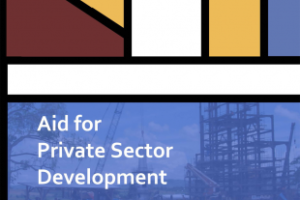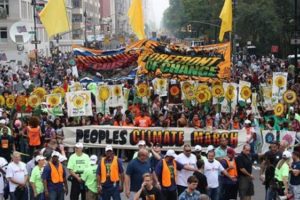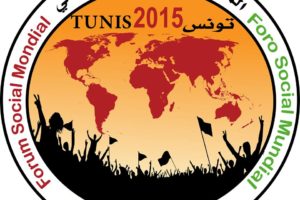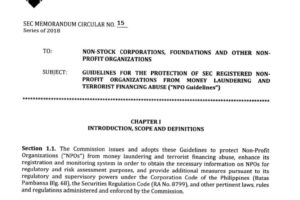[[{“type”:”media”,”view_mode”:”media_large”,”fid”:”571″,”attributes”:{“alt”:””,”class”:”media-image”,”style”:”width: 310px; height: 361px; float: right;”,”typeof”:”foaf:Image”}}]]
Today the world finds itself far off track in realizing the vision of the Rio Declaration on Environment and Development. Global economic expansion continues to severely strain the environment. Humanity’s ecological footprint now exceeds the planet’s biocapacity by over 50%, and three of nine planetary boundaries that define the safe operating space for human life on Earth have been breached.
And the costs and benefits generated by that economic expansion are shared very unequally. In 1990, the ratio of the per capita income in the richest 20 countries to that in the poorest 20 was $42 to one dollar; in 2005, it was $59 to one dollar. One out of three persons today or about 1.75 billion people live in acute deprivation in terms of health, education and material standard of living. There are 80 million more people living in income poverty in 2005 compared to 1981 if the handful of BRICS (Brazil, Russia, India, Chima, South Africa) economies are excluded. And close to a billion people do not even have the very basic condition for human existence, that is adequate food.
The gravity of the multiple crises confronting the world today — not the least of which is the climate crisis — is forcing people to re-examine fundamentals. People’s values and lifestyles, their conceptions of the good life, social relations as well as the relationship of man with nature – all these are being reconsidered and reimagined. To put it bluntly, there is no real development possible unless it transcends the present economic and social system that engender these crises.
Significance of Rio+20
Rio+20 in 2012 thus comes at an opportune time, when the world’s states and peoples are obliged to rethink alternatives to the current development model with its ever-increasing failures. It presents opportunities to push urgently and comprehensively the agenda for sustainable development.
The 2012 UNCSD must deliver and not backtrack on the promises and commitments made in Rio twenty years ago. Rio+20 must reaffirm and operationalize the principles expressed in the 1992 Rio Declaration including the polluter pays principle; the precautionary principle; the principle of common but differentiated responsibility and capability; and Principle 10 on people’s participation and access to information and justice. Rio+20 should come out with an honest appraisal of
weaknesses in the implementation of Agenda 21, aim for ambitious, timebound and concrete goals, and establish mechanisms for a just transition to genuine sustainable development.
The best way to re-affirm the Rio principles is to promote a rights-based approach to sustainable development in response to the grave economic, social and environmental crises confronting the world today. A rights-based approach to sustainable development is founded on the notion that improving the well-being of present and future generations is a matter of empowerment, equity and justice. It lays down a clear mandate for public officials to take action and provides conditions for rights claimants to hold duty bearers accountable, including governments, intergovernmental organizations, donors, international financial institutions, transnational corporations, international NGOs and so on.
The duty of states and the international community to respect, protect and fulfill legally-binding human rights obligations enshrined in the Universal Declaration of Human Rights, human rights treaties and covenants including the Right to Development, should be the basis of discussions in Rio+20 alongside commitments previously made in Rio in 1992 and the UNCSD process since then. Only on the basis of these can outcomes in Rio+20 be expected to rectify and strengthen the social, economic and ecological dimensions of sustainable development in a holistic and integrative manner.
On the Green Economy
Many civil society groups are concerned that the Green Economy theme chosen for the Rio+20 does not fully or holistically address the social, economic and ecological challenges of sustainable development today. Many civil society organizations are dismayed that the leading advocates of the green economy approach confuse economic growth with development. Moreover, many CSOs fear that the green economy agenda will consist primarily of market-based, private-sector led initiatives or technological fixes that may inadvertently reinforce corporate control over natural resources and environmental services at the expense of the people who are most dependent on these resources.
There is also the fear that market-based schemes such as carbon trading and offsets allow cop-outs for large polluters and therefore continue to lock-in the same unsustainable patterns of production and consumption.
Instead, we call on governments to support sustainable alternative knowledge and practices that are in the hands of the people – biodiverse ecological agriculture, community-based renewable energy systems, community-driven stewardship of ecosystems – and the values of buen vivir or living well as opposed to unbridled
consumerism. These make the building blocks of genuine people-centered sustainable development that enhances people’s well-being, equity and justice for all. But they need to be supported and promoted by an enabling environment.
Crucial to this is the democratization of ownership, control, and decision-making over productive resources and assets in society. We should move towards more democratic modes such as cooperative, community-based, commons or public forms of ownership to ensure that economic activity provides sustainable livelihoods for all and meets the developmental goals of the community and society. This means implementing thoroughgoing agrarian, aquatic and forestry reforms for the benefit of smallholders, women and indigenous peoples in particular, and the public in general, and to strengthen community-based stewardship of natural resources and ecosystems.
There is a need to promote sufficiency-based economies (i.e. catering primarily towards meeting local needs and demands, developing local capacities, based on available resources, appropriate technologies and resource sharing).
Countries should have food sovereignty, including the right to determine their patterns of food production and consumption, and famers should be able to prioritize food production for domestic consumption. Local and national food systems should provide food that are healthy, of good quality and are culturally appropriate. Food production and consumption should be localized as much as possible while food reserves should be established at the local, national and even regional level to raise the resilience of food systems.
There must be an end to perverse subsidies and support for the fossil fuel industry, for agrofuel plantations, for large scale mining, big dams, industrial farming and fishing and other activities that destroy lives and livelihoods of present and future generations. Instead, there must be a rapid transition away from fossil fuels as energy sources and towards a mix of new, renewable energy sources, some particularly amenable to decentralized and local use such as wind, solar, and micro-hydro power.
Manufacturing should promote closed-loop production where products are designed with minimum use of energy and materials, longer lifespans and with maximum reuse and recycling of parts and components. There must be greater support for mass public transportation but walking and biking should also be promoted as modes of transport for short distances.
On the basis of public, cooperative and community-based forms of ownership, participatory and inclusive modes of decision-making and planning can ensure that economic activity contributes to meeting the goals of the community such as
employment, health, education, and so on. The principle of subsidiarity—devolving decision-making to as local a level as appropriate—should be promoted. This should reignite local political reengagement.
Policies should respect cultural diversity, and modern science should be combined with traditional knowledge in bottom-up approaches of research and development to develop technologies that are appropriate and democratic.
International trade, investment, finance and development cooperation should be reoriented around rules that value, respect, protect and fulfill people’s rights; economic, social, gender ecological and climate justice; self-determination and self-sufficiency.
A sustainability transition will involve adjustment costs. The highest costs will fall on global corporations, polluting industries and elites who will need to adjust to an economic redistribution. But the poor will also be affected, especially workers that work in fossil fuel industries when the shift to renewables take place. Workers will need to be reskilled for green jobs. Also, Southern countries that depend on energy and manufactured exports to the North will feel the pain when a transition to lower consumption begins in the North. A coordinated transition within and between countries is necessary to cushion the impacts to the poor. Assistance from the North in the form of financing, technology cooperation, and capacity building are of utmost importance to support developing countries make the transition.
On Institutional Framework for Sustainable Development (IFSD)
To deliver on the promises of the first Earth Summit, there is also a need for an effective, democratic institutional framework that can and will ensure economic progress, social equity and environmental protection in an integrated and holistic manner.
Building a strong apex body on the sustainable development that works on a global level and can integrate or coordinate the work of disparate multilateral bodies working on one of the three pillars of sustainable development is necessary and urgent. Some of the options on offer are promoting the Commission on Sustainable Development into a Council on Sustainable Development, or establishing a UN Organization on Sustainable Development. Any option should uphold and operationalize the principle of common but differentiated responsibilities and respective capabilities, and acknowledge that poor countries constitute the majority. Second, it must be fully inclusive, participatory and democratic, giving equal voice and opportunities for participation to non-state actors.
A rights-based approach to the IFSD means that duty-bearers should have explicit mandates expressed in clear, preferably legally binding, human rights standards. There must also be judicial or quasi-judicial mechanisms that are effective at delivering entitlements, responding to complaints, and ensuring accountability. These mechanisms of redress must also be accessible, especially to vulnerable and marginalized groups.
A rights-based approach to sustainable development underscores the democratic right of people to determine the goals and means of achieving sustainable development. Along this line, the development and adoption of a global or regional conventions on Principle 10 of Rio based on the Aarhus Convention should be supported. This will help ensure access to information and meaningful participation of people in sustainable development, and access to effective judicial and administrative proceedings, including redress and remedy.
Rio+20 should work for the immediate establishment of a broad inclusive multi-stakeholder consultative body tasked with supporting the promotion and implementation of Agenda 21 and Rio+20 resolutions. Such body should be participatory, democratic, and have an integral multi-stakeholder character.
The UN Human Rights Council should also establish Special Procedures for the Right to Sustainable Development, including the appointment of a Special Rapporteur on Human Rights and Sustainable Development. Such an expert or experts will be tasked with reviewing international, national and regional case law and practice with a view to clarifying the linkages between social, economic and environmental issues from a rights-perspective; elaborating on applicable human rights standards and indicators.
The OHCHR should also collaborate closely with UNEP, the proposed Council on Sustainable Development or World Environment Organization, if and when they are established, in order to develop guidelines and propose actions to be taken by governments, intergovernmental bodies and other actors to consistent with human rights obligations.
Ultimately, the effectiveness of a global body on sustainable development rests on the effective functioning of similar institutions at the local and national levels and its relevance to people’s lives.
Commitments from the North in the form of adequate financing (according to common but differentiated responsibility), appropriate technology cooperation, and needs-based capacity building are of utmost importance to support developing countries make a just transition to sustainable development pathways.
On SDGs
The proposed Sustainable Development Goals should not be confined to merely addressing the symptoms of poverty, exclusion and ecological degradation like the millennium development goals. Instead, SDGs must address the roots of these problems including the question of rectifying unequal power relations within and between countries, and the dominant development model based on neoliberal doctrine.
The SDGs should also affirm the Rio principles, including the principle of common but differentiated responsibility and respective capacity. They should not be donor-driven targets or technocratic exercises in formulating indicators and monitoring progress. They should be based on Agenda 21 but also consistent with human rights obligations, including the Right to Development.
Today, even more so than twenty years ago, peoples of the world are aware that the challenge of genuine sustainable development requires no less than the profound transformation of societies and of international relations. We must all rise up to the challenge.




